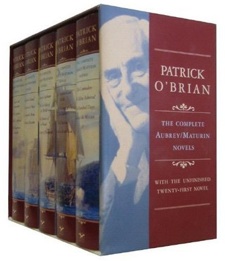On my way to MilPhil, the 2001 Worldcon in Philadelphia, I was re-reading The Fortune of War, Book 5 of Patrick O’Brian’s twenty volume Aubrey-Maturin series. On the bus in Newark taking me to the connecting plane, I saw a stranger reading Book 18, The Commodore. “Are you going to Worldcon?” I asked. She was. I therefore contend that the Aubrey-Marurin books, while ostensibly historical novels about the friendship between a naval captain and a ship’s surgeon during the Napoleonic Wars, are in fact SF. If that’s going too far, then at any rate they have the fannish nature, they are naturally appealing to people who like to read SF and for much the same reasons.
I do not normally read Napoleonic sea stories, they are not my thing. I started reading these when they were recommended to me by Pamela Dean, and you wouldn’t think they’d be her thing either. She recommended reading them in order,“if you’d normally read the chapters of a book in order,” and really she’s absolutely right. Nevertheless, I went on to read the eighteen books then in print in totally random order, as inter-library loan delivered them to me. Sorting out the meta-order, which is utterly apparent if you read them normally, became the thing I did to get myself back to sleep when I woke up in the night. For some reason, I couldn’t find The Nutmeg of Consolation for months, and trying to deduce the events of it drove me mad. I eventually bought it—the first one I bought.
My second read was in order. Waterstones, then my local bookshop, did a promotion selling the first book for a pound. I then read all of them in order, buying the ones that weren’t on the shelves in libraries in walking distance. When I lived in Sketty, there was a library about a hundred yards away, on the street I lived on. There was also a central library in town, about a mile away. I used to walk in and get the bus back: books are heavy. So I read them in order, which was nice, and I owned about half of them. Then my husband started reading them. He was working in Cambridge at the time, and coming home for weekends, and he started taking one with him for the train journey. He bought me all the ones I didn’t have, filling in the gaps so that I had a complete set.
I have just started what is either my fifth or sixth re-read.
The thing that’s so great about these books isn’t that they’re historically accurate and give a picture of the whole planet at the turn of the nineteenth century. They certainly do that, but if that were all I wouldn’t get homesick for them. It’s not the character portrait of the two very different central men—bluff, good-natured Jack Aubrey with his desire for riches and promotion, and the Irish naturalist doctor Stephen Maturin. They are great portraits, and change splendidly over time, and I’m very fond of both of them, faults notwithstanding. It’s not the way O’Brian contrives to gives you information in an interesting way after you want it and before you need it, though I admire that extremely. Nor is it the way he does such astonishing things between volumes and when you’re not looking, such that you see the consequences and not the events. It certainly isn’t the nautical jargon—I’m sure Jack knows what cross-catharpings are, but Stephen and I couldn’t care less. It’s not the plot—though the books have very good plots and the series as a whole has the most excellent swell of plot that runs through it. It’s not even the fact that Stephen calls Jack “my dear” in the least affected way possible.
The truly great thing about these books is that they suck you into their world and while you are reading you are entirely caught up within it, and it is as alien and fascinating a world as anything you might find around another star. And you don’t question it, it’s absolutely real, and you are head down inside it. I want to compare them to Cherryh and Bujold and Vinge and Brust.
If you haven’t read them then you are very lucky because you can still read them for the first time. Having said that, they are books I find much more comfortable to re-read knowing what’s going to happen than I did the first time through—O’Brian has a tendency to throw things at you hard that can leave you breathless.
What I usually do is alternate the first few with other books and then get so immersed in O’Brian that I can’t stop. I’ve just re-read Master and Commander and will be doing a weekly read-along of the series starting today and featuring every Monday. This series of posts will be with spoilers, as there’s no other way to talk about them. It starts with Master and Commander.
Jo Walton is a science fiction and fantasy writer. She’s published eight novels, most recently Half a Crown and Lifelode, and two poetry collections. She reads a lot, and blogs about it here regularly. She comes from Wales but lives in Montreal where the food and books are more varied.










